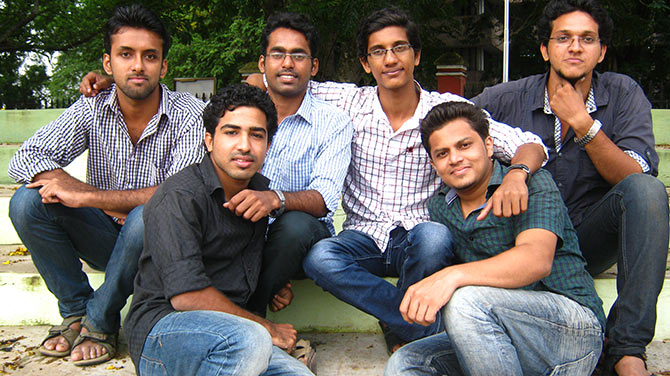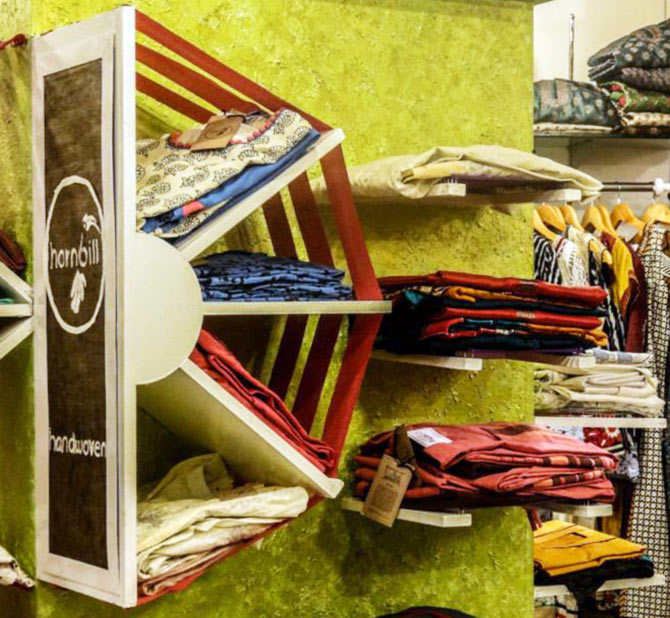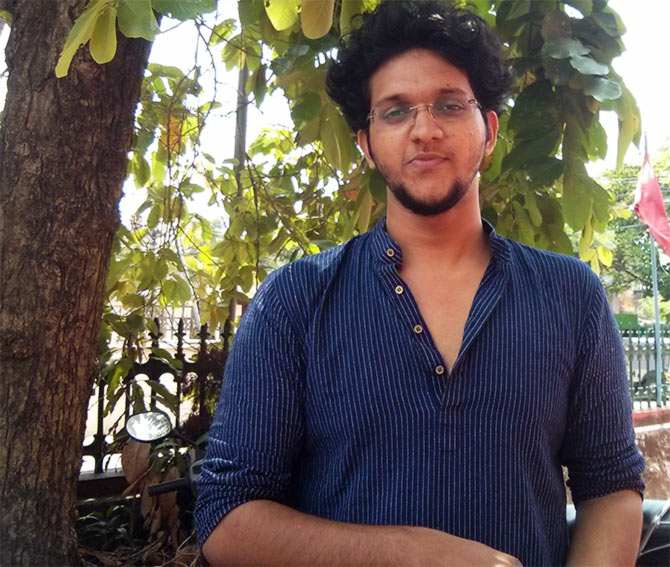 | « Back to article | Print this article |
These engineers have big ideas to revive Kerala's handloom sector
Unlike most engineering students who accept good offers from multinational companies, Raqib Rasheed, Ashik Salim, Syamkrishnan P A, Anto D Akkara, Shehaz V B and Muhammad Junaid, students of College of Engineering in Thiruvananthapuram, rejected these job offers to engage in social entrepreneurship.
They are only 22 years of age but they have already done their bit to revive Kerala’s handloom sector where more than 50,000 traditional weavers are struggling to survive.
Even before they graduated in 2013, they floated a social enterprise called The People’s Company.
Rafiq Rasheed, the chairman of The People's Company, talks to Rediff.com about how and why he and his friends became social entrepreneurs, and the challenges they face working with the government in a state that is famous for labour problems.
You all studied different branches of engineering. How did you come together to start People's Company?
Though we were from different engineering branches, we grouped together because of a common ideology and social activities.
We were active in social activities like teaching poor students and helping the socially backward. We were also actively involved in the Left movement.
We decided to start People's Company as a social enterprise so that all of us could be together in future also.
We decided that when we passed out, we would do something that was connected with society-building but we had no idea how to structure our idea.
Sanjay Vijayakumar, the chairman of the Startup Village in Kochi told us to visit the additional chief secretary of industries, V Somasundaram who, he said, was very interested in bringing youth into the government system.
How did Somasundaram guide you?
He asked us to be part of one of the public sector undertakings to revamp the system so that they run more effectively.
He gave us a list of undertakings that were under him. Handloom was one of them and we chose to work in the handloom sector.
Why the handloom sector?
Though we were engineering students, all of us were more inclined towards the Arts and used to frequent the Fine Arts College.
That was one of the reasons we chose handloom. We knew it was a dying industry but we wanted to revive the sector in whatever way we could.
We felt that handloom could be branded as fashionable clothing.
Please click NEXT to continue reading
'... there was disconnect between production, distribution and the market'
Did you do a study of the handloom sector?
Yes, we did. After our final exam, we did a study of the handloom sector to be submitted to the government.
For one month, we travelled and visited cooperative societies all across Kerala.
We found that the sector was not at all structured. There was no proper production and marketing.
There were many middlemen. In many places, weavers waited for middlemen to come in as they had no channel to distribute their products.
According to government records, there are one lakh weavers in Kerala. We could find only 30,000.
We also found that the number of weavers was steadily decreasing with the new generation not choosing this as a means of livelihood.
At the same time, there was a huge market for the products, which meant there was disconnect between production, distribution and the market.
What were your plans for revamping the handloom sector?
Based on our findings, we gave a basic proposal to the government on how to revamp the sector. We proposed branding, integrating all the co-operative societies, and building a management system.
We told Somasundaram that we had no plans to go back after giving the report. We wanted to implement our proposals once we passed out of college.
That was how we were given a contract for two years, starting July 1, 2013. We first did a study on the textile market in Kerala, then on where handloom stood in the market and what we could do to make handloom a textile business.
We found that Kerala was a huge textile market but there was no textile production.
How did you plan to exploit the untapped handloom market?
The first thing we did was bring on board Aarti and Rasna, two young designers who had just passed out of NIFT, Mumbai and NIFT, Rae Bareli.
We took them with us to the weavers and showed them the material. We wanted them to design the fabric first. We decided to pay them from our grant.
After designing our own fabric, we looked at branding our products.
We found that there was no handloom brand for ladies in Kerala. So, we decided to create an exclusive handloom brand for women.
We named it Hornbill.
We named the test run Operation Phoenix.
Please click NEXT to continue reading
'We are very fortunate that at 22, we have understood that money is not everything in life'
As entrepreneurs, would you be able to run a business working solely with the handloom weavers?
What we are doing with the handloom weavers is part of social entrepreneurship which we are committed to. But we knew we had to look at other business models too to survive as entrepreneurs.
That is why we decided to diversify our activities in the textile sector. The textile market in Kerala is as big as Rs 6000 crore and we want to exploit its potential.
That is when we got the idea to start a garment factory.
What are your future plans for your business?
Through Hornbill we have already tied up with a textile unit in Germany to export garments, textiles and furnishings.
By 2017, we plan to have at least five stores outside Kerala.
Any satisfying moments so far?
We are too young to talk about satisfaction; we have not done much.
But working with the co-operative societies of handloom weavers and being able to pay them double the wages for a whole day's work and still make a profit was one of the satisfying moments of our lives.
We want to continue this. We showed the government that it was viable to have a profitable business model in handloom.
Another satisfying moment was when we were able to assemble all the arts and science students for Creative Rebel and inspire them.
We are very fortunate that at 22, we have understood that money is not everything in life.
What were the challenges you have faced so far?
The biggest challenge was working closely with the government.
In the case of Operation Skylark, we are facing a lot of hurdles. Hantex (the apex society of primary handloom weavers’ co-operative societies in the state) is filled with a lot of small-time politicians and they don't want the operation to take off.
We are facing a lot of problems from various trade unions too.
Though the ministers and top-level bureaucracy is ready to help us, there is a lot of red-tape in the lower and middle level bureaucracy. They do not understand the causes that we are taking up.
The IAS officers may be very helpful but the clerical staff do not understand what social changes we are trying to bring about. They don't seem convinced. This is a huge challenge we are facing.
Our project was fully funded by the government. The funds were supposed to come to us on July 1, 2013 but they came to us only on November 23, 2013. It took five months for the funds to get transferred to us.
We raised Rs 2 lakh on our own and went ahead with the project before the funds came. We had just passed out, and could afford Rs 2 lakh. But for anyone else, any professional who wants to work in tandem with the government and make a change in society, it will be very discouraging.
I must add that while the bureaucracy was troublesome, handloom weavers were more helpful and forward looking.
They wanted the system to undergo a change.
When we were starting Operation Phoenix, the weavers gave us the fabric on credit. For that, we are very grateful to them.
Please click NEXT to continue reading
'Actually, we are trying to make a statement by starting the garment factory in Kannur, in Kerala'
You have just completed one year. What lessons have you learnt?
We do not call ourselves just entrepreneurs; we are social entrepreneurs.
One person who guided us constantly was the minister of industries and information technology P Kunjalikutty. When we showed him our plans, he told us that governments can't run businesses and should not either. He said that it was not because of any flaw but it is structured in that way. We didn't believe what he said.
One year down the line, we understand that governments are not meant to do business. This is the biggest lesson we have learnt.
We have also learnt how to use other people's time and our time efficiently.
Last year, we used to go to our mentors with silly problems all the time; now, we know we should go only to certain people for certain things so that we will not waste their time and ours. Now, we know the problems we ourselves can solve.
We have also learnt that thriving in a labour intensive industry is not easy considering the labour culture of Kerala.
Still, we have a lot of support and a lot of mentors who can advise us.
It is not about becoming just entrepreneurs but riding against the wave. In Kerala, even the established entrepreneurs do not go for labour intensive businesses.
But you are now starting a labour intensive garments factory in Kerala…
Yes. We are not only starting a garments factory, we are starting it in the hub of trade unionism in Kerala - Thaliparambu in Kannur.
Kerala Industrial Infrastructure Development Corporation (KINFRA) has a huge textile park in Kannur sanctioned in 2009 but not a single unit is functioning here. We chose this place as the infrastructure for single window licence is there.
We are going to start our factory in a unit that was closed down three years ago due to labour problems.
We did a one-month labour study in Kannur and found that the people of Kannur and even the small time politicians regret the closing down of the only unit that was there, and they have promised all help to us by giving us many suggestions.
Perhaps they want us to start a factory and things may change after that. We are waiting to see how everything goes.
We will start the factory on July 20. This will be the biggest challenge in our one-year-old career as entrepreneurs.
We, the youngsters of Kerala want to tell the entire country how the labour culture of this state is changing.
Actually, we are trying to make a statement by starting the garment factory in Kannur, in Kerala.



